#Russian Literary Scene
Text
Literary Terms
Allegory. A kind of story that has a meaning deeper than its obvious one, and it’s a sort of extended metaphor. A famous example is Bunyan’s "The Pilgrim’s Progress", which ostensibly tells the tale of the journey of its protagonist Christian, but has a symbolic meaning that describes the journey of a Christian from Earth to Heaven. In Medieval times, allegory was commonly used to communicate religious messages, but later it became a way of commenting on politics or society. "Gulliver’s Travels" by Jonathan Swift and "Animal Farm" by George Orwell are both examples of allegories that use bizarre stories as parallels for real political and social situations; Swift was commenting on everything from particular politicians to entire countries, while Orwell’s tale reflects events in the run-up to the 1917 Russian Revolution.
Aside. A device that has been used in plays for centuries, involving a character directly addressing the audience without the other characters being able to hear. It’s part of the story, usually kept brief and often used comically to gossip or make a comment about another character behind their back. Some films make use of this technique too, with a character looking directly into the camera to address viewers, known in this context as ‘breaking the fourth wall’. This is something "Amelie", the eponymous heroine of the French film that bears her name, does frequently by whispering conspiratorially to the audience.
Litotes. Understatement used for rhetorical effect, and usually makes use of double negatives for emphasis. For example, rather than stating overt enthusiasm for something, one might say that it was “not bad”. Another example might be “He’s not unintelligent”, as a means of saying that someone is intelligent (or even a genius). While understatement might at first seem a peculiarly British trait, the use of litotes is common in a number of European languages, and was a strong feature of Old English poems and Icelandic sagas. There are also instances of its use in the Bible, and even as far back as Homer’s epic "The Iliad", in which Achilles is described by Zeus as “neither unthinking, nor unseeing”.
Pathetic fallacy. A literary device in which human emotions are attributed to aspects of nature, such as the weather. For instance, the weather can be used to reflect a person’s mood, with dark clouds or rain present in a scene involving sorrow. It’s a form of personification. A novel that famously makes use of pathetic fallacy is Wuthering Heights, by Emily Bronte, the stormy characters and tumultuous relationships of which are reflected in the novel’s setting: the bleak Yorkshire Moors. Ferocious thunderstorms mirror Heathcliff’s aggression, and elsewhere reflect the turmoil Cathy must go through in choosing between Edgar and Heathcliff. Pathetic fallacy is even present in the name of the novel, which is also the name of the farmhouse in which the story is set; the word “wuthering” refers to wind so strong that it makes a roaring sound, or to a place characterised by wind that roars. Such threatening weather is used to create a sense of foreboding, forming a menacing backdrop to a story populated by characters whose violent and jealous temperaments are hugely destructive to themselves and others.
Stream of consciousness. This literary technique describes a character’s interior monologue (a continuous flow of thoughts going on in the character’s mind). It’s a technique that came to the fore in the 20th century, famously championed by Virginia Woolf in "To The Lighthouse" and, more bafflingly, by James Joyce in his groundbreaking novel "Ulysses", in which the idea of a stream of consciousness is taken to its extreme. Trying to represent the randomness of human thought processes literally, Joyce penned paragraphs like this: “My missus just got an. Reedy freckled soprano. Cheesparing nose. Nice enough in its way: for a little ballad.”
#literature#poetry#writing#writers on tumblr#writeblr#poets on tumblr#writing prompt#creative writing#writing reference
53 notes
·
View notes
Text
Writing Byler into the Narrative: Chekhov's Lie
Am I making a post about a topic that has already been talked into the ground and needs no further explanation? Yes! Because it's my blog and I get to talk about whatever I want.
So when discussing whatever the biggest "byler proof" is, the easiest and best answer is simply "the narrative." But what exactly does that mean?
Well aside from the characterization and themes tending to point in that direction, there's also a major literary rule at play— Chekhov's Gun
So this is Anton Chekhov.
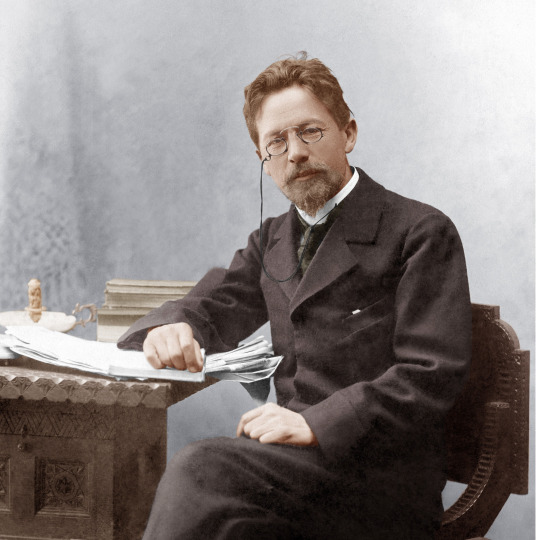
Famous Russian playwright. Prolific short story author. Very important to the dramatic and literary world.
Chekhov sees one of his colleagues plays and writes him a letter that says "Hey, if you're gonna go through the effort putting a gun on stage, just make sure it goes off, okay? Otherwise, don't put it there." or something to the effect of that.
"Chekhov’s gun is a dramatic principle that suggests that details within a story or play will contribute to the overall narrative. This encourages writers to not make false promises in their narrative by including extemporaneous details that will not ultimately pay off by the last act, chapter, or conclusion. Chekhov’s gun has become a highly influential theory of effective writing that mandates noticeable details are integrated into the plot trajectory, character development, and mood of the work."
Here's a simple example of Chekhov's gun used in the show:
Chekhov's Purple Palm Tree Delight
While burying Hero Agent Man in the desert, Argyle get's stressed out and Jonathan tells him in supposedly a throwaway line to smoke some Purple Palm Tree Delight to help him feel better.

And then later in the Piggyback when they need to distract the Argyle clone in the Surfer Boy Pizza, BAM. Jonathan pulls out a fresh Purple Palm Tree Delight.
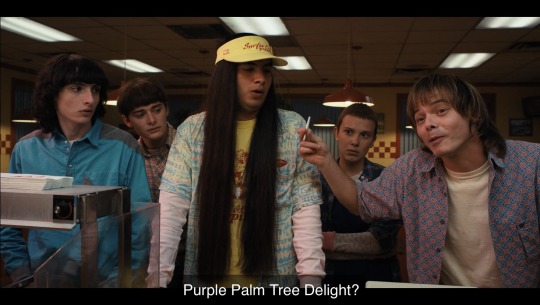
What serves as a small detail in one episode, serves a larger purpose in a future episode. It's a very simple yet effective plant and payoff. The gun has been Chekhov'd.
What happens if the gun does not Chekhov?
For this I'll use an example from a different show, here's a scene from Euphoria season 2. (spoilers, btw)
At the start of the scene, the character Nate loads a gun from inside of his car as he is going to confront his dad. We have seen this gun before. Oh my god, is Nate going to kill is dad? The audience may wonder.
Nate then puts the loaded gun into his right pocket as he enters the building where his dad is staying.
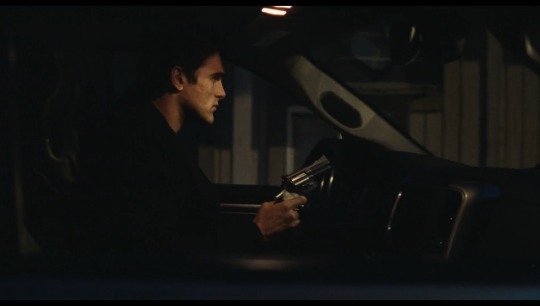
Later in the scene, we see Nate reach into his right pocket and pull out the gun he just loaded.
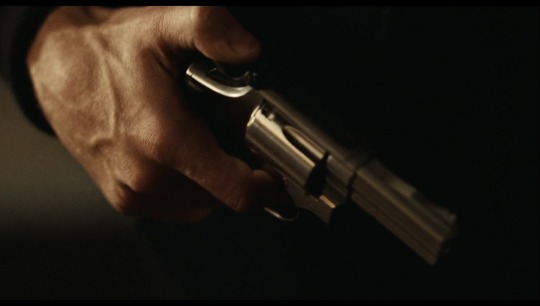
We then see Nate put the gun away into his left pocket, reach back into his right pocket, and pull out— a flash drive?

Granted this flash drive does have pre-established importance, but why the fuck did Nate have that gun with him, if he wasn't going to use it? The most basic rule of a Chekhov's Gun?
I know that it was likely there just to build suspense for the audience, but considering that Nate's gun has already been established (and used) earlier in the season, the show didn't need to build-up the importance of the gun earlier in the scene if it wasn't going to payoff. If we saw Nate putting his hand into his pocket in a threatening way, there might be enough there for the audience to suspect he has his gun in there before doing the twist with the flash drive. It would have given the same effect of suspension and subversion of expectations without it feeling like a shitty non-payoff.
I can only speak for myself, but when this happened I was just baffled and annoyed. What was the point of all that? When a Chekhov's Gun doesn't go off, it feels super unsatisfying.
Another good example of a gun that never Chekhov'd is the Jules-cheating storyline that became inconsequential, was not the reason Jules and Rue even broke up, was seemingly forgotten and forgiven by the end, and did nothing but give fans a reason to hate Jules.
And Now: The Van Scene
We've all seen it and we all know it. Will gives Mike the painting we saw earlier in the season, the one that's supposed to be for someone that he likes, which was a Chekhov's Gun in itself. We saw the painting earlier in the season and now it's being revealed. The gun is Chekhoving.
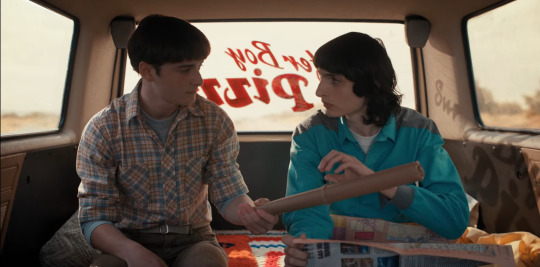
Really the painting itself has already payed off, but what this scene does is establish a new Chekhov's Gun that has yet to go off, and that's the lie that Will told Mike— that the painting was from El, not him.
Even if this wasn't the "friends don't lie" show, I mean, a lie in a tv show that goes undiscovered and has no major consequences? I mean come on. It's almost too obvious.
Did this gun already Chekhov?
Technically there is still somewhat of a payoff to this lie being told, even if the reveal that it was a lie hasn't happened yet. We see the consequences of Will's lie in this scene here:
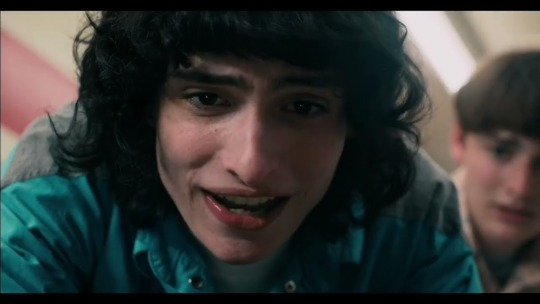
Ah yes, the monologue. You know the one, where Will is over Mike's shoulder the whole time, the one spawned by Will remarking "your the heart" which is a reference to the van scene we all just witnessed in which Will pours his heart out to Mike under the guise of it actually being El's feelings? Yeah that monologue.
Contrary to popular belief I am of the opinion that Mike's monologue is NOT the reason El lost to Vecna, however Mike finally confessing immediately followed by El losing does not make it look any better for them. I don't think that the lie had world ending consequences, but it definitely had emotional ones.
The reveal of the lie can lead to one of two things happening (not all once)
Mike finds out that Will lied to him about El commissioning the painting. Mike and El stay together despite it all, Will accepts that Mike doesn't love him back.
Mike finds out that Will lied about El commissioning the painting. El and Mike do not stay together because the feelings of love are not genuine. Mike and Will, despite Will's expectations, end up together since that what Mike's feelings of love are in response too.
The biggest difference between the first scenario and the second scenario is that the first one is already happening right now.
Mike and El are still together by the end of the season, and Will already thinks that he doesn't have a chance with Mike.
Why cock the gun if setting it off is just going to keep things the way they were?
Of course this Chekhov's gun isn't the only "proof" working in byler's favor, and I wouldn't have suggested the second scenario if the show didn't also give Mike an arc where he couldn't say I love you to his girlfriend, make him act weird around Will, actively push themes of non-conformity, among other things.
Combined with everything else, I do still consider Chekhov's Gun to be the biggest proof of byler. Not following through with one of the most popular rules of dramatic writing just to hold together a weak relationship? OK
tl;dr: Byler canon because a Russian playwright said so

#havent really had an analysis in a while so here is a post about a thing everyone already knows about#but god dammit if i dont love narrative conventions and applying them to my hyperfixation#my analysis#stranger things#byler#tw guns
99 notes
·
View notes
Note

Saga, my dear, the time has come! It's the 10th anniversary of Peaky Blinders and I'm curious know your top 10 Alfie moments??
Hello darling! 🥰 goodness it really has been 10 years 🙈 can’t believe it!
Well, as a certified academic Alfie researcher I’d say my top are:
1. The introduction. Because everything we see when meeting Alfie Solomons, and everything we hear, is perfection. The vibes, the lighting, the soundtrack, the iconic lines are perfection. When watching s1 I was crushing on Tommy a little bit, but I have to admit that s2 made me forget about him posthaste 🙈
2. Every single one of Peaky fans can physically hear this quote: “Tommy, I will fuckin’ shoot you.”
3. The talk with Darby and the iconic “I know what I know. If you don't know then you don't fucking know, do you?”
4. Him wailing at the coppers who came in to arrest Arthur—honestly, peak cinema. We all know it was Alfie’s scheme, we all know the cops are paid for, we all know the cops are as bewildered as we are. Alfie did not have to go as hard as he did with the performance, but he did it anyway. Legendary.
5. “You're fuckin about with the Russians, ain't you, you silly boy?” Whoever gave Alfie permission to call Tommy “a silly boy” is a literary genius. Though I strongly suspect it was Tom Hardy’s own improv.
6.
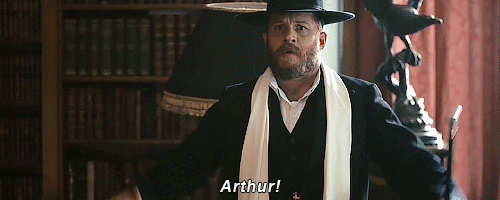
7. The whole scene in the Russian vault when Alfie not only casually revealed a bit of his own lore, he also delivered another iconic burn, this time to the Russian aristocracy.
8. “Tommy, when a pikey walks in with hair like that, you’ve got to ask yourself, Have I made a mistake?” — I have it on good authority that Cillian broke character many times during filming of that scene.
9.
“Now, how soon did you know that I was not dead?”
“You wrote me a letter, Alfie.”
“Did I?”
“Yeah, you asked about your dog.”
The way I squealed in that moment when I first watched that scene. ICONIC. From the casual “my best enemy” vibe to Alfie going straight to the topic of his dog’s wellbeing. What I would give to read that letter, it must have been mad.
10. I couldn’t find the specific moment but just the thing that happened here when he said “oh look, a ship” and then put the binoculars only to his seeing eye—he absolutely did not have to do that!!! But he only did it to spite Tommy, I’m sure, and to highlight once more the fact of having been shot in the face, you know 😂
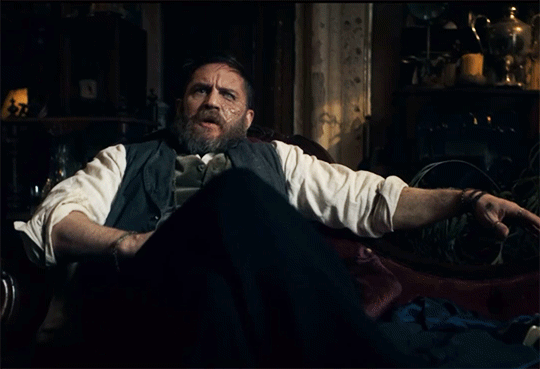
Bonus: “Yeah, look at that little cunt ascending, he’s ascending to the heavens! Right in front of us. Before our very eyes.”
49 notes
·
View notes
Text
THIS DAY IN GAY HISTORY
based on: The White Crane Institute's 'Gay Wisdom', Gay Birthdays, Gay For Today, Famous GLBT, glbt-Gay Encylopedia, Today in Gay History, Wikipedia, and more … May 10


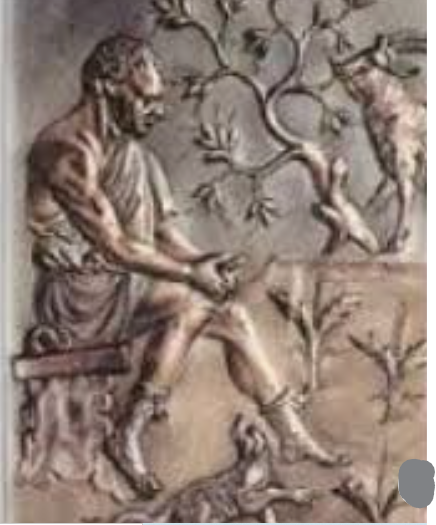
c.308. BC – Little is known of Theocritus, the first great voice in the homoerotic pastoral tradition. He appears to have been born in Sicily in the late fourth century B.C, and to have lived both at the court of Ptolemy Philadelphius (patron of the great poetic school of Alexandria) and in Syracuse, where he is reputed to have died around 240 B.C
His significance for gay literary history resides in the fact that five of his thirty Idylls map the emotional and poetic terrains of intense—especially frustrated—homosexual desire that later poets would explore in greater detail.
For example, "Hylas" (Idyll 13)—one of the most famous homosexual lyrics of the ancient world—subverts the traditionally heroic values of Greek poetry by noting how even Hercules could not resist loving a beautiful boy, "golden-haired Hylas," who drowned when, trying to fetch water for his lover, he was pulled down by the nymphs of the stream who fell in love with him and wanted to keep him as their own. Hercules, unable to save his lover, lapses into madness in his grief. For Theocritus, love's power is stronger than the physical might of even the greatest hero.
"For a Boy" (Idyll 29) warns a beautiful young man who scorns the speaker's love that he too will age and his beauty lose its freshness. Thus, if he does not "show more kindness" and "return the love of a man who is true" now when he is young and lovable, no one will show him any affection later when he himself is old and desperate for a beautiful young man's attention.
The speaker of "For Another Boy" (Idyll 30), who finds himself falling in love again after a particularly painful experience, knows full well that "as a man grows old, / he should steer himself clear of the love of young boys." Love, however, answers him that the only alternative to loving a boy is to cease to exist.
His Idylls are the source of a homoerotic pastoral tradition that includes Virgil's second eclogue, Spenser's Shepherd's Calendar, and Barnfield's Affectionate Shepherd, as well as anticipates the homoerotic confusion in the Forest of Arden in Shakespeare's As You Like It, Milton's "Lycidas," and possibly even Whitman's Calamus poems.

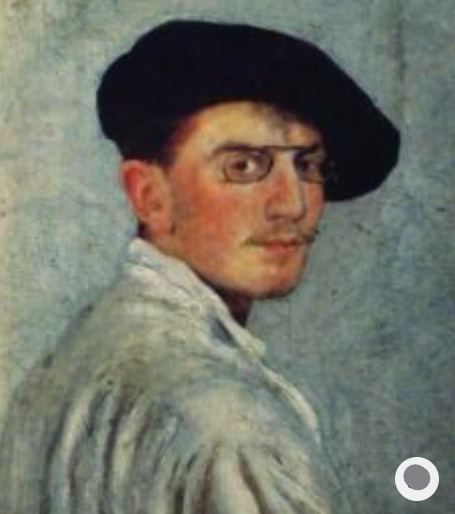
1866 – Léon Bakst (d.1924), Born as Lev Samoilovich Rosenberg, was a Russian painter and scene- and costume designer. He was a member of the Sergei Diaghilev circle and the Ballets Russes, for which he designed exotic, richly coloured sets and costumes.
At the young age of twelve, Léon won a drawing contest and decided to become a painter, but his parents did not really take a shine to it. After graduating from gymnasium, he studied at the St. Petersburg Academy of Arts as a noncredit student, because he had failed the entry, working part-time as a book illustrator, though, he would eventually be admitted into this institution in 1883.
At the time of his first exhibition (1889) he took the surname of "Bakst," based on his mother's maiden name. The surname "Rosenberg" was thought to be too Jewish and not good for business.At the beginning of the 1890s he exhibited his works with the Society of Watercolourists. From 1893 to 1897 he lived in Paris, where he studied at the Académie Julian while still visiting Saint Petersburg often. After the mid-1890s he became a member of the circle of writers and artists formed by Sergei Diaghilev and Alexandre Benois, which later became the Mir Iskusstva art movement.
In 1899, he co-founded with Sergei Diaghilev the influential periodical Mir Iskusstva, meaning "World of Art." His graphics for this publication brought him fame.
Beginning in 1909, Bakst worked mostly as a stage-designer, designing sets for Greek tragedies, and, in 1908, he made a name for himself as a scene-painter for Diaghilev with the Ballets Russes. He produced scenery for Cleopatra (1909), Scheherazade (1910), Carnaval (1910), Narcisse (1911), Le Spectre de la Rose (1911), L'après-midi d'un faune (1912) and Daphnis et Chloé (1912). During this time, he lived in western Europe because, as a Jew, he did not have the right to live permanently outside the Pale of Settlement. During his visits to Saint Petersburg he taught in Zvantseva's school, where one of his students was Marc Chagall (1908–1910).
Bakst died on the 27th of December 1924, in a clinique in Rueil Malmaison, near Paris, from lung problems, (oedema). His many admirers amongst the most famous artists of the time, poets, musicians, dancers and critiques, lead him to his final resting place, in the Cimetiere des Batignoles, in Paris, during a very moving ceremony.


1952 – Robert Triptow, born in Salt Lake City, Utah, is a writer and "the last of the underground cartoonists." His 1989 anthology Gay Comics is one of the earliest histories of the subject, and won the first Lambda Literary Award for Humor.
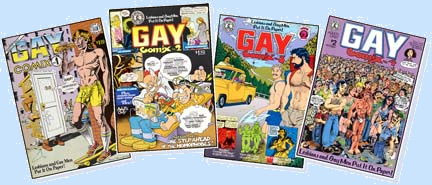
As a cartoonist, Triptow's contributions to Howard Cruse's Gay Comix began with issue #2. He succeeded Cruse as editor of Gay Comix, from issue #5 (1984) through issue #13 (1991).
As a journalist, Triptow has contributed to The Advocate, Bay Area Reporter, Frontiers, The Sentinel, and other West Coast gay publications.


1961 – Born in Whangarei, New Zealand, Blyth Tait, son of a horse breeder, won his first two of four world equestrian games gold medals at twenty-nine and his first two of four Olympic medals two years later at Barcelona in 1992. That year he topped the world standings at #1, a position he held for almost all of the 90s.
At the 1996 Atlanta Olympics, Tait won a gold in individual eventing and a bronze with his team. Returning to the Olympics in Sydney in 2000, he was given the honor of bearing New Zealand's flag in the opening ceremony's parade of global athletic hotness, which for the first time included his partner Paul O'Brien, also on the equestrian team. Horribly, days before his competition Tait's horse died suddenly in quarantine, his back-up horse was rendered lame, and he failed to medal.
At the Athens Olympics in 2004, he ranked fifth. After several years in retirement, he tried to win a spot on the New Zealand for the 2012 London Olympics. In the history of New Zealand Olympians, he ranks fourth in total medals earned.
He resides at the property he owns with his long-term partner Paul O’Brien in Karaka, south of Auckland.


1962 – The California Supreme Court overturns the sodomy conviction of a man caught by police in a public restroom by use of a peephole drilled into the roof.


1974 – Quentin Elias (d.2014) was a French singer, actor and model. Of Algerian heritage, he was the original lead singer of the French boy band Alliage with Steven Gunnell, Roman Lata Ares and Brian Torres from 1996 to 1999. After his departure from the group, he relocated to the United States where he developed a solo singing career singing in English and French, releasing a number of albums, EPs and singles through his company Quentin Elias Music and distribution by Electro Boy Inc Records.
In New York hereleased the single "Always the Last to Say Goodbye", produced by Christian Moeyaert. He also performed at local gay venues and events such as Splash Bar, and Tom of Finland events.
He also worked as a model, acted in a number of feature films, television series and on stage and was featured in a number of advertisements. He took part in documentaries notably The Adonis Factor appearing on the documentary's promotional cover. He was active in body training, tattooing, in photography and in active blogging of his progress, all the while releasing more materials online.
He was briefly involved in solo adult maturbation appearances on the Randy Blue gay male site under the pseudonym Q. He made a comeback in France starting in 2011, appearing in a number of tours, made new releases for the French and European markets, including remakes of earlier Alliage hits and had a number of appearances on popular French reality television shows and on talk and entertainment shows talking candidly about his past. On 25 February 2014, Elias died at his home in New York City.

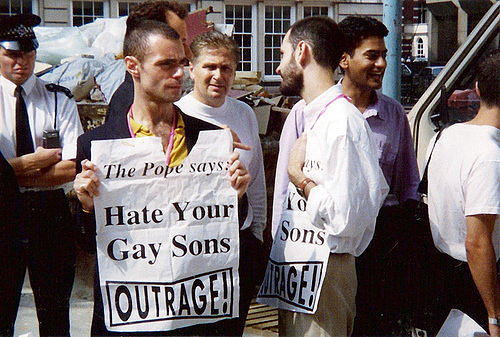
1990 – On this date OutRage!, a United Kingdom direct action group is formed. OutRage! is a direct action campaigning group in the United Kingdom which was formed to fight for what they saw as the rights of Lesbian, Gay and Bisexual people. It is a radical group which has frequently been criticised for being extremist; members have been arrested on some OutRage! actions. For a time in the mid-1990s, some OutRage! actions were perceived as being a version of outing, where Gay activists assert the alleged private homosexuality of public figures as part of a political campaign.

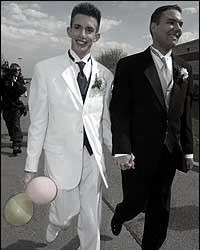
Marc Hall and his prom date JP Dumond
2002 – On this date Canadian Gay teenager Marc Hall won an injunction permitting him to bring his boyfriend to his prom.
Marc Hall v. Durham Catholic School Board was a 2002 court case in which Marc Hall, a Canadian teenager, fought a successful legal battle against the Durham Catholic District School Board to bring a same-sex date to his high school prom. The case made Canadian and international headlines.
Marc Hall v. Durham Catholic School Board began when Oshawa, Ontario's Monsignor John Pereyma Catholic Secondary School asked students attending the prom to submit the names of the guests they intended to bring. Hall, who is gay, submitted the name of his 21-year-old boyfriend, Jean-Paul Dumond, and was denied on the grounds that homosexuality is incompatible with Roman Catholic teaching.
Supported by his family and a wide variety of community organizations, Hall thus took the school board to court in a two-day hearing that began on May 6, 2002. Hall's lawyer, David Corbett, argued that the denial of his request violated the Ontario Education Act, which requires school boards in the province not to discriminate. The school board, on the other hand, argued that court interference in its decision would amount to denying its religious freedom.
Corbett argued that an organization that accepts public funding (Catholic school boards in Ontario are fully funded in the same manner as public schools) has to be accountable to the same laws (including anti-discrimination laws) as other public institutions. The school board's lawyer countered that Section 93 of the Canadian constitution protects the Catholic board's rights to conduct its affairs in accordance with Catholic teaching.
In addition, Corbett noted that while extramarital sex is also contrary to Catholic teaching, the school board had previously allowed pregnant, unmarried students to attend the prom.
On May 10, Justice Robert McKinnon granted an interlocutory injunction ordering that Hall be allowed to attend the prom with Dumond. The justice also ordered that the school would not cancel the prom. Hall attended the Prom with Dumond that evening.


16 notes
·
View notes
Text
One of Russia’s most famous 20th-century novels has returned to the Silver Screen. Infamously difficult to capture as a motion picture (more mystical observers even speak of a curse), Mikhail Bulgakov’s “The Master and Margarita” is back, reinterpreted by American-Russian filmmaker Michael Lockshin. The new movie stars Evgeny Tsyganov and Yulia Snigir in the titular roles and features German actor August Diehl (Gestapo major Dieter Hellstrom in Quentin Tarantino’s “Inglourious Basterds”) as the story’s demonic character Woland. Meduza reviews the controversy surrounding the film’s director and funding, the book’s cinematic history, and Lockshin’s adaptation.
The political controversy
Michael Lockshin’s “The Master and Margarita” averages an impressive 7.9/10 rating with more than 43,000 reviews at KinoPoisk and leads Russia’s box office in its opening week after earning 57.3 million rubles ($640,000) on its first day in theaters, but the director was making enemies before his film ever sold a single ticket. Self-described patriots denounce Lockshin as a Russophobe, a traitor, and a neoliberal besmircher of the intrepid Soviet secret police. They call him a hypocrite, too, in light of the fact that this new adaptation of Bulgakov’s classic was made (in 2021, before the full-scale invasion of Ukraine) with 800 million rubles ($8.9 million) from Russia’s Cinema Foundation, the state’s key funding agency for the domestic film industry.
Lockshin, who now resides in the United States, declined to answer Meduza’s questions about the backlash in Russia, saying he’s not yet ready to comment on the situation. On Telegram, pro-war channels have circulated screenshots of Facebook posts that are now hidden from non-friends where Lockshin shared independent reporting about the war in Ukraine, wrote that he’s donated to Ukrainian organizations, warned that future generations of Russians will be paying reparations for the “tragedy they brought to Ukraine,” and compared the Putin regime to Nazism in Germany.
State propagandist Tigran Keosayan has advocated criminal charges against Lockshin, while Trofim Tatarenkov, a host on Russia’s state-run Sputnik radio (who admits that he hasn’t even seen Lockshin’s movie), called the filmmaker “scum” and fondly remembered how such “enemies of the people” were shot during the Stalinist era.
Previous adaptations
In May 2016, poet and literary critic Lev Oborin wrote an essay for Meduza answering several “questions you’re too embarrassed to ask” about Bulgakov’s “The Master and Margarita,” including the most shameful of all: Can I just skip the book and watch a movie version instead? The short answer is, yes, you can always skip the book. In fact, unless you’re a student or some other kind of hostage, you can skip the movies, too. But since you asked, there are at least two previous screen adaptations of “The Master and Margarita” worth knowing about.
The better-liked version, at least until now, has been Yuri Kara’s 207-minute film, made in the mid-1990s but not released until August 2011. Meanwhile, in 2005, Vladimir Bortko created a miniseries for Russian television that was criticized for uneven casting and even worse special effects. Unfortunately for Bortko, the 10 episodes drew deeply unfavorable comparisons to his beloved 1988 adaptation of Bulgakov’s “Heart of a Dog.”
It’s also tempting to contrast Bortko’s miniseries with Kara’s adaptation — particularly how the two portrayed one of the novel’s most visually scandalous scenes: Satan’s Grand Ball. Filmed almost a decade later and made for TV, the sequence in Bortko’s series “looks almost puritanical” compared to Kara’s film, noted Lev Oborin. In raw terms of nudity and violence, this assessment is hard to contest:
youtube
So, is Lockshin’s adaptation any good?
Anton Dolin (a prominent Russian film critic who might be best known to casual Internet users as the interviewer who provoked Ridley Scott into saying, “Sir, fuck you. Fuck you. Thank you very much. Fuck you, go fuck yourself.”) liked Lockshin’s adaptation quite a bit. In a review published by Meduza, Dolin writes that the film “manages to retain the sharpness of the original source, which mocks Soviet power, and at the same time offers the viewer an innovative perspective on a classic text.”
Dolin praises Lockshin’s “Hollywood flourishes” and his capacity to juggle the book’s “genre and intonation incompatibility,” which has plagued past interpretations. The new adaptation brings a “circus element” to the story without sacrificing the script’s “rigidity,” says Dolin, while also “condensing the vastness of Bulgakov's novel into a coherent and clear narrative.” (You’ve been warned, formalists.)
Lockshin’s film takes some liberties with Bulgakov’s classic. For example, in the novel, the Master character doesn’t emerge until the middle of the book, leaving the reader to wonder about the title. In the new film, however, the main plotline belongs to the love story between Margarita Nikolaevna (the unhappily married wife of a Soviet functionary) and a writer she calls the Master. According to Lockshin’s script (which he co-wrote with Roman Kantor), the secondary narrative involving Pontius Pilate’s trial of Yeshua Ha-Notsri (Jesus of Nazareth) is a play within the story written by the Master and pulled from production by Soviet censors after its opening performance. (In a feat of authenticity unprecedented in modern Russian cinema, the Jerusalem scenes, which comprise roughly 10 minutes of the film, are performed in Aramaic and Latin.) Meanwhile, all the adventures across Moscow involving Woland and his entourage are presented as figments of the Master’s imagination as he slowly loses his mind under state persecution.
As Lockshin has argued in comments promoting the movie, Dolin says Bulgakov’s novel enjoys heightened relevance in contemporary Russia, and the new film makes menacing villains of NKVD executioners while presenting even more revolting characters in the Soviet elites whose conformity and hypocrisy enabled the Stalinist regime.
Dolin praises the decision to cast August Diehl as Woland, the mysterious foreigner whose visit to Moscow sets the plot rolling in the novel. Diehl’s Woland “is a real find,” Dolin writes. The German actor plays the character as “an infernally sarcastic gentleman in black” who resembles Satan “more than the thoughtful, sad wisemen from various Russian interpretations of the same character.”
A cartoonishly scary foreigner, complete with a spooky German accent, Woland turns out to be the creation of the writer’s wounded mind, his alter ego, writes Dolin. The censorship and persecution the character faces in the film are a “chilling reproduction” of mechanisms that resonate more in Putinist than Stalinist Russia, Dolin argues, highlighting some lines that wink boldly at modern-day realities, including nods to Crimea, oil production, and military parades.
Lockshin’s adaptation also features a fantastical version of Moscow that recalls the visionary designs of artists in the Higher Art and Technical Studios, which flourished in the 1920s before crumbling under Stalinism. In this universe, Moscow completed the Palace of the Soviets, altering the skyline in a delirious finale that depicts the city ablaze. This scene, in particular, has upset several state propagandists.
Dolin notes that Margarita is absent from the story for much of the film, but she reappears in the final act as a heroine on her own narrative arc. In the character’s scenes as a witch and then a queen, Lockshin’s intentions and the meaning of the novel’s title finally become clear, says Dolin:
It’s not the imagination of the writer that transforms the grim reality but exclusively the emotion that is capable of elevating you to the heavens, of burning cities, and punishing or pardoning with the mere force of thought. In the end, Lockshin’s film is not about Satan, not about Moscow, not about Pilate, and not about totalitarianism, censorship, or creativity, but about love. It alone makes a person invisible and free.
22 notes
·
View notes
Text
YA/fantasy/romance/romance subplot authors, can you please stop doing this:
Indicating that you have an enemies-to-lovers romance coming up from Chapter 1 by making your protagonists very, very aware of each other and attracted to each other.
I'm looking at:
"My hand accidentally brushed his bare wrist and he flinched as if he hated me so much he couldn't bear to touch me, however briefly."
NO THAT'S NOT WHY HE'S FLINCHING YOU DUMBASS.
"Jacob Fonteroy annoyed me in so many ways - his condescending attitude, the smirk that he seemed to reserve just for me when he most wanted to get under my skin, his blatant displays of wealth being just a few of them - but all of these would have been bearable if he hadn't been so annoying handsome as well."
SO YOU THINK HE'S HANDSOME DO YOU.
"You just hate me because I beat you in that test/support the opposing side in the war/destroyed your chances in the big competition but guess what, Jacob? I don't care about your opinion!"
Jacob's big brown eyes under their unexpectedly soft lashes widened and for a moment I felt a shred of remorse. He almost looked... upset? Could it be that I was mistaken about him all along? Then the expression was gone and replaced by his customary expression of cool indifference. I huffed to myself, pushing down an unwelcome feeling of disappointment and turned away.
"Wait- Esmerelda!" It was Jacob but I had no patience to listen to him.
YEAH YOU REALLY DON'T CARE ABOUT HIS OPINION AND HE DEFINITELY HATES YOU.
I made up these examples in 5 seconds flat and what I'm really getting here is that I should totally write a romantasy book about Jacob and Esmerelda which lbr would get snatched up for publication immediately because I'm a white woman who writes fanfiction but the point is that you have definitely read these examples several times over in different books. They've become a kind of enemies-to-lovers indicator in the same way that if you want to write a villain in a Hollywood blockbuster you make him a posh Englishman with a moustache and a vaguely homoerotic partnership with a Russian mob boss called Volkov.
It's really insulting to readers. They've probably picked up the book partly because it's enemies-to-lovers so the author has decided they need to reassure them right from Chapter 1 that THESE PEOPLE ARE INTO EACH OTHER. THEY'RE NOT ACTUALLY ENEMIES. DON'T WORRY. But the point is, firstly that this writing is unbelievably lazy but also it's not enemies to lovers! It is not actually normal to spend all your time thinking about how your deadly enemy looks/smells/whatever. If you start Chapter 1 with the characters already acknowledging to the reader some kind of attraction then half the fun is gone. This acknowledgement should come somewhere in Book 2 of the trilogy and be accompanied by TOTAL HORROR. Please actually give me enemies before you give me overt literary markers of sexual attraction. I miss subtlety and understatedness in the depiction of romance. I miss attraction and compatability being shown through dialogue and the odd unevaluated long glance or raised eyebrow. Trust me, authors, you do not need to be so explicit*. It's very boring.
*totally unrelated to whether the book has explicit make-out or sex scenes - that's different.
#books#enemies to lovers#writing#if anyone can work out what i'm currently reading i'd be very amused#but this particular book is just solidifying things i've noticed for a while
11 notes
·
View notes
Text
Zodiac Signs, Cities & Curious Facts! 🌆
Each city was selected by me from "The Rulership Book" by Rex E. Bills, alongside one fact that matches that particular sign's energy! There are more cities and places that align with the vibration of each sign, but these are the ones I picked for this post. All pictures are from Google Images.
Enjoy this random and (hopefully) fun thread!😁
♈Aries: FLORENCE, Italy
Florence has a unique street festival: The "Calcio Storico" is a traditional street football game played annually there. The game involves four teams representing the four historic quarters of the city, and it's known for its rough and intense style of play!
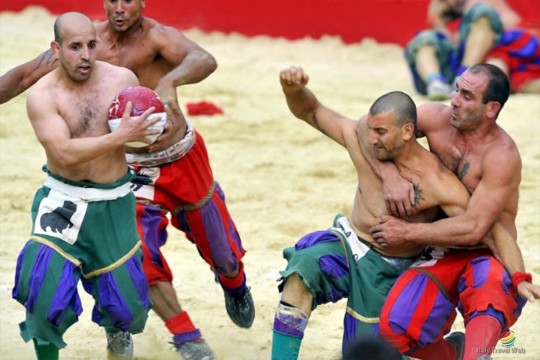
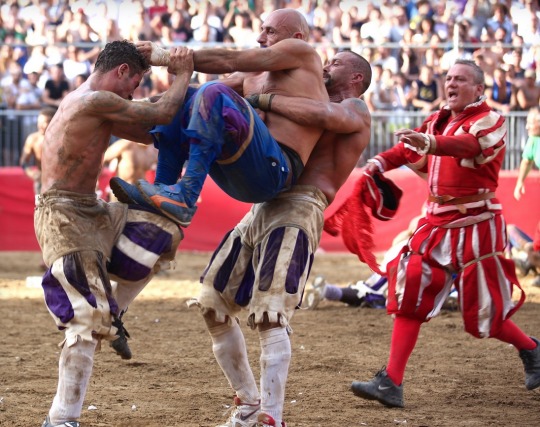
♉Taurus: LEIPZIG, Germany
Leipzig is known as the "City of Music": Leipzig has a rich musical heritage and is considered one of the world's most important cities for classical music. Famous composers such as Johann Sebastian Bach, Richard Wagner, and Felix Mendelssohn Bartholdy have strong connections to Leipzig, and their music is celebrated in the city's numerous concert halls, museums, and festivals.
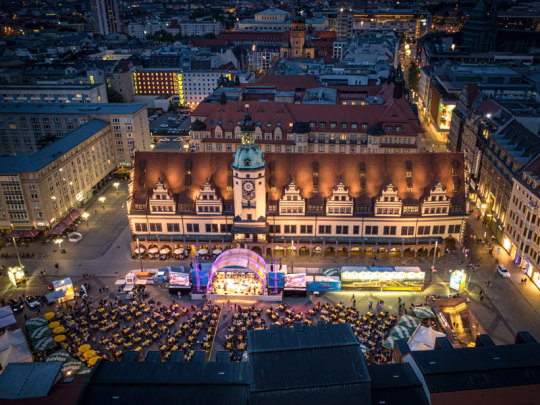

♊Gemini: LONDON, England
London has a "whispering gallery": The Whispering Gallery in St. Paul's Cathedral is a circular gallery that runs around the interior of the dome. Due to its unique acoustics, if you whisper against the wall on one side of the gallery, the sound can be heard on the other side, over 100 feet away.


♋Cancer: ISTANBUL, Turkey
Istanbul has a famous street for cats: The "Cat Street" or "Kedi Sokak" in Turkish is a narrow street in the historic district of Sultanahmet that is home to dozens of stray cats. The cats are well-fed and cared for by locals, and the street has become a popular tourist attraction.

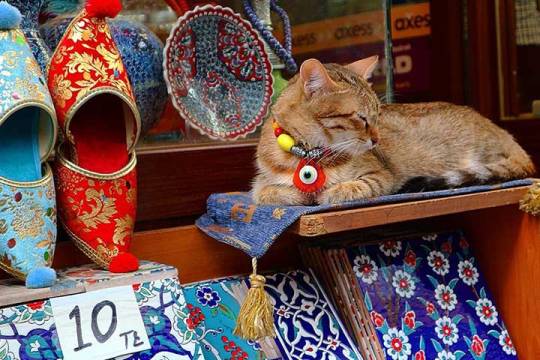
♌Leo: BERLIN, Germany
Berlin is a graffiti artist's paradise: The city has a long history of street art and is home to some of the most famous graffiti murals in the world. The East Side Gallery, a section of the Berlin Wall that has been turned into an open-air gallery, features over 100 paintings by artists from around the world.


♍Virgo: MOSCOW, Russia
Moscow has a rich literary history: Many famous Russian writers, including Leo Tolstoy, Fyodor Dostoevsky, and Anton Chekhov, lived and worked in Moscow. It also has the largest number of public libraries in the world: "The Russian State Library" , which is the largest library in Europe and the second largest library in the world, after the Library of Congress in the United States.


♎Libra: VIENNA, Austria
Vienna has a rich musical history: Vienna has been a center of musical innovation and creativity for centuries and has been home to many famous composers such as Mozart, Beethoven, and Strauss. Today, the city is renowned for its classical music scene and is home to the world-famous Vienna Philharmonic Orchestra.
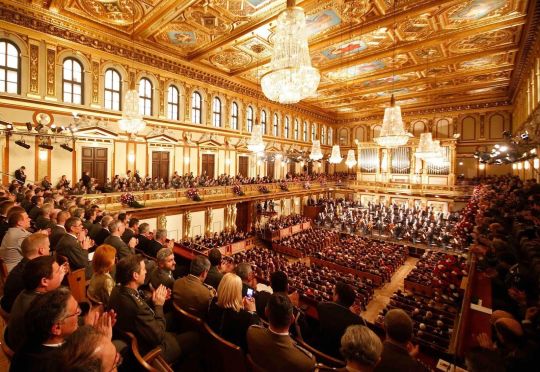
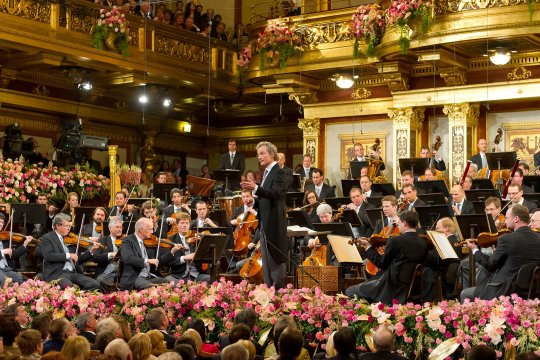
♏Scorpio: TOKYO, Japan
Tokyo has a unique fashion scene: Tokyo's fashion scene is known for its avant-garde and eclectic styles, with Harajuku being the center of youth fashion culture. "Gothic Lolita" is part of Harajuku, and it incorporates darker and more macabre elements into the Lolita fashion aesthetic.


♐Sagittarius: TUSCANY, Italy
Tuscany is home to the oldest university in Europe: The University of Bologna, which is located in Tuscany, is the oldest university in Europe, having been founded in 1088. It is still one of the most prestigious universities in Italy.

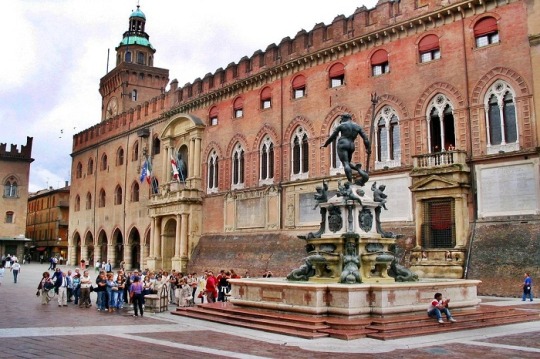
♑Capricorn: BRUSSELS, Belgium
Brussels is home to the "Atomium": The Atomium is a unique architectural structure in Brussels that was built for the 1958 World Exposition. It is designed to represent an iron crystal magnified 165 billion times, and it has become an iconic symbol of the city.


♒Aquarius: LOS ANGELES, California
LA is the birthplace of the Internet: The first successful transmission of a message over the Internet occurred on October 29, 1969, between two computers located at the University of California, Los Angeles (UCLA) and the Stanford Research Institute. This event is considered the birth of the Internet.


♓Pisces: GALICIA, Spain
Galicia is home to an ancient spiritual destination: The Way of St. James, also known as the Camino de Santiago, is a famous pilgrimage route that leads to the cathedral of Santiago de Compostela in Galicia. Every year, thousands of people from all over the world make the 780 km journey on foot, bicycle, or horseback. Many of them walk the route for spiritual reasons, while others enjoy the physical challenge and the opportunity to meet people from all over the world.


Now, that was a pleasure to put together! How do you feel about the fact/city for your sign? As a Virgo, I'd love to visit the Moscow library, but as a weird/edgy fashion sucker, Tokyo seems like a whole lot of fun! Also, the Aries one made me LOL! Y'all just can't stop fighting, can you? 😂
Which fact/city is your favorite one(s)? Let me know down below! 🖤
- Foxbörn
ᴍᴀꜱᴛᴇʀʟɪꜱᴛ 1
ᴄʜᴀʀᴛ ʀᴇᴀᴅɪɴɢꜱ
ᴡᴀɴᴛ ᴛᴏ ʙᴜʏ ᴍᴇ ᴀ ᴄᴏꜰꜰᴇᴇ?
#astro notes#astrology#astro observations#astrology notes#birth chart#zodiac#astro community#zodiac signs#horoscope#aries#taurus#gemini#cancer#leo#virgo#libra zodiac sign#scorpio#sagittarius#capricorn#aquarius#pisces#travel
134 notes
·
View notes
Text
Fate / Up against your will / Through the thick and thin / He will wait until / You give yourself to him. Echo & the Bunnymen, The Killing Moon
These are dark tales of things that lurk deep within men… These stories would not please you. Dark Souls III
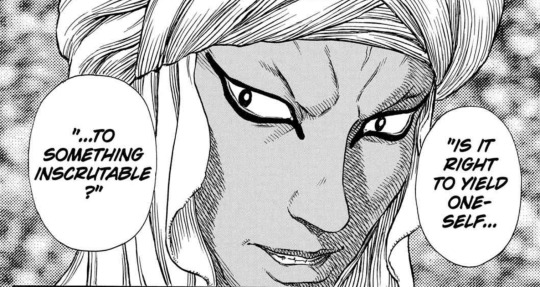
This is an aside from the series of meta analysis that I am writing about Berserk. I really didn’t expect to like this manga at first, let alone wanting so much to understand what I felt I wasn’t able to grasp behind the surface level. Years ago when I first approached it, I was actually quite unimpressed by the first chapter.
I should add: the first Italian edition was unfortunately flipped and I really disliked that choice back then. Some other series at that time (late 1990s) had started to be published in their original format and I didn’t find it difficult to adapt my reading habits to the original layout from right to left. Reversing the artwork in a manga like Berserk? I am sorry but that was criminal. Not only the characters would have their swords in their left hand but the mirror effect could seriously affect the energy of the line work and the overall harmony of the panels. Big scenes with a battle on horseback flipped? I couldn’t really get over it. Another manga, maybe? But Berserk? Art and composition are such a huge aspect of it, I didn’t love to have to compromise. The last two editions eventually came out with the original right to left flow, but also so much more expensive, it is a crime of another kind. So that is how I came to read the English version. Gatsu became Guts (I don’t know about that because now I think about the meaning of the word in English and I don’t particularly like it). Grifis became Griffith. Falcons became hawks.
So, I wasn’t impressed by the first chapter, definitely discouraged by the flipped artwork and annoyed by… Puck! I must say, I never really liked fantasy as a genre, especially because it uses creatures and I didn’t know what to make of this elf that contrasted so much in mood with the main character. I grew up reading a lot of novels that were considered classics in my culture and that was a great number of nineteenth century literary realism, French and Russian novels and Italian historical and realist novels from the nineteenth and the twentieth century. And literary realism was born from dissatisfaction with the irrational forces and themes of romantic and gothic narratives, aiming to look at the human experience directly and in an unfiltered way. I still prefer stories that are like that and the dark and gritty side of Berserk makes up for the fantasy aspects and what is more, Berserk seems to have the goal to criticize the irrational forces it represents rather than idealize them. And I am also quite comfortable when love is a thing but it isn’t framed under the romantic lens, that aren’t universal but quite culturally specific and distinctive.
Guts also wasn’t exactly an exciting main character for me at the beginning, it really was easy to mistake him for Kenshiro from Hokuto no Ken. Which I didn’t have anything against, that anime had such a good title track in its Italian adaptation, and the general desolate atmosphere was fascinating, although I watched it when I was too young to actually consider the story, I only remember the vibes. But I have never been into brooding, stoic and exaggeratedly burly men or 1980s action heroes. Reading further and I was very relieved that Guts wasn’t one of those.
Maybe Berserk wouldn’t have been back in my radar if it hadn’t been for the Souls games, new editions and anime adaptations coming out and in the end Miura’s own passing. So I started reading it again or for the first time in its digital version, completing it up to the current chapters. Reading it now that I am older definitely makes it easier to understand the scope of it and appreciate it. I think that Miura was definitely an ambitious man. His hands were exceptional, although I mourned the unpolished look of the paper and ink when he made the decision to move to digital drawing. Same hands but different surface, different way of absorbing the effort of those hands and the disappearance of the materials into numbers. There are volumes in the middle of Berserk that are just glorious for me, artistically, better than the first ones because the artist was practicing to the point of overworking and becoming incredibly good, better than the last volumes when he chose the hard support of the drawing tablet and the passages between lines and white could only be neater than what it used to be.
When analyzing it, one thing that I found impressive is how cohesive the story feels in its themes considering that it started in 1988 and that continues on under such unique circumstances: Miura and Mori’s relationship being fascinating in itself, in relation to the creation of Guts and Griffith’s dynamic. Berserk started to be published more than three decades ago. I want to point out how difficult can be to begin a story in your twenties, seeing it published monthly as you are likely working with only general ideas of where you want it to go and as you grow older. The editing was minimal. I would like to have more information on this point but I don’t think it was a big concern for a manga being published in Young Animal for Hakusensha of all places. As I often say in this blog, context matters and, although most people read and approach Berserk in its paperback or bunkobon format, all its chapters have been published first in a magazine that is primarily intended for young male readers attracted by photos of gravure idols on the cover and that expected to see erotic scenes, violence and maybe would also get into a story deeper and maintain the interest as long as those elements were there. Nothing wrong with that in my opinion, especially because many beloved novels that are considered classics were originally published periodically as well. And Miura’s approach to the erotic and violence doesn’t feel gratuitous when you think of the story in its entirety and complexities. In the history of art that I am familiar with the human body has always occupied such a central role and themes similar to those of Berserk are frequent and this is probably another big reason why my interest has been picked. It is familiar and not. I am careful about context! It’s manga, not chivalric romance, it’s a contemporary and commercial mixed form of art and not fresco paintings depicting stories on the walls of aristocratic houses, the author is Japanese and not oblivious to a great deal of European and western culture but is also much more immersed in his own culture and using the Japanese language. Kanji on a manga page or beside any drawing aren’t just words, but they are also synthesis of other images as well and images/sounds/concepts that add a lot to the art, most of it lost in a translation. And frankly, my major pet peeve is that the western fandom sometimes doesn’t really understand that the recognizable forms and themes of Christianity and heresies are seen and used from the outside and from a point of view that doesn’t ignore a whole lot of other religious traditions. And other religions have much more influence on certain themes presented in Berserk: suffering or rebirth mainly are two big themes at risk of being acritically absorbed from a Christological perspective that to me personally doesn’t feel right if we keep in mind the overall context of Berserk as a work of fiction and as a manga.
The only major edit that Miura was able to make when Berserk was published in volumes was the removal of chapter 83. If we consider the conditions in which Miura worked, for the first years it would have been very risky to even consider taking a hiatus, I would assume that he didn’t have much time to even make changes or adjustments in his work. But the removal of chapter 83 is interesting. Having been published in the magazine, even when it is missing from current publications, copies are around and available to see. That chapter, that comes before the Conviction arc, was removed because, rumors say, Miura thought it would have given away too much. I think that chapter 83 made Berserk’s Gnostic point of view too overt. Not surprising considering Miura took a lot of inspiration from Go Nagai’s particular brand of religious syncretism and that Gnosticism was frequently discussed in the 1970s and 1980s and probably still is.
I am not an expert on religious studies, I have a very superficial knowledge of just about anything related to religions. I am actually an atheist myself, if anything it is maybe easier for me to understand when an artist operates from an outside point of view rather than from inside a particular faith. Through art and music especially, and thorough words and practices used maybe carelessly, I am not completely ignorant of a plurality of religious beliefs. I might not approach the topic from a believer’s perspective nor for personal spiritual needs, but I am interested in it because of intellectual curiosity and interest in humanity. I don’t position myself above or below, just outside religion. I know I’ll never have enough time or intelligence to even know enough of a single interpretation of one major religious tradition, let alone severals. From a complete superficial perspective, I can only sense and try to understand Miura’s approach to those themes. I am able sometimes to recognize the sources and influences that colored his views on certain topics. I wouldn’t remember enough about Gnosticism from what little I studied in school many years ago, and I wouldn’t have any idea about the occult and many forms of religious syncretism if it wasn’t for having listened to a lot of rock music and being immersed into the popular culture that surrounded it, including manga. Same thing I can say about Nietzsche’s philosophy. I studied a little bit of German philosophy in high school, part of the standard curriculum, and I read on my own The Birth of Tragedy Out of the Spirit of Music when I was sixteen. Young Nietzsche, younger me. I can’t say I remember much besides the highlights of his philosophy. But then I became more and more intimate with David Bowie, his particular approach to music and art and how those things interact with society. Believe me or not, David Bowie is probably my favorite critic and commentator of Nietzsche, even when he didn’t do it through academic writing, but through his music, his own life and artistic outputs. And I love that. This is why I love Berserk too. Maybe because Bowie and Miura were artists whose work became vastly popular, they are easily misunderstood or considered to not belong in the same category of academic discourse about Nietschean philosophy, and just approached superficially, yet they were much more likely to discover the fallacies because they looked into it from a human experience, Bowie through himself and embodying his characters and Miura through drawing and voicing them. To me they actually managed to get rid of pedantic attitudes that keep people away from useful forms of philosophical criticism and learning. But it is entirely possible that I am just not smart enough and Miura’s moods and approach agree with my general worldview and I am indulging myself here.
Why am I writing all this? In part I am probably stalling. I keep postponing the moment I’ll have to write about the central theme that most fascinated me in Berserk, but it is also the more painful aspect: Griffith’s self delusion and the numerous other instances of illusions and mirages that humans don’t have the strength to resist. I haven’t even talked about Farnese or the Lost Children chapters for the same reason. It is daunting to put my thoughts into words intelligently and in a way comprehensible to others (hopefully). But that’s why I started this series of meta. And I am writing my analysis on tumblr because I rather be in the company of those appreciating and analyzing the queer and sentimental aspects of this manga, but I also think that the “romantic” element is a part of it but not exactly central to the story. I think that under those lenses alone the manga would just be quite imbalanced, bad and definitely tragic, less interesting or remarkable to me. Love is a major theme but I don’t think it’s developed through the romantic tradition intended as a cultural invention. When Miura drew and wrote about love, he wrote about the immense difficulty of it on many levels, including the familiar one, the lack or withholding of it from parental figures, the abuse of the spontaneous love of children, the fear of being vulnerable and connecting with others, the desire of intimacy and the dark side of it, the impulse to leave relationships and abandon people behind. I have the impression that through this story, I can see another side to my own experiences. Is society pushing young men to believe that they have to do everything alone, knowing that they can’t succeed, while is telling women that they can’t do anything by themselves, knowing that they won’t be welcomed? Why are we being bullied and forced apart, divided into bullshit categories and separate worlds when we would be better facing the hardships of life with as many allies as we are able to keep? Not alone and not exclusively through a romantic dimension or sexual favors or money deals. Why are we following blindly teachings that have already been proven false and so damaging? What price do we pay for not following the rules?
#berserk#berserk meta#general considerations about Miura’s art#background and other thoughts#eri reads berserk#manga analysis
13 notes
·
View notes
Text
20 Questions for Writers
Thank you so much for the tag @wendingways I'm FINALLY getting around to it. :D
How many works do you have on AO3?
132
2. What’s your total AO3 word count?
2, 962, 169
3. What fandoms do you write for?
Star Wars, Hornblower, Narnia [just one]
4. What are your top five fics by kudos?
Mirjahaal
Bajur
He Who Sheds His Blood With Me
Forging Ahead
I Felt You In My Bones
5. Do you respond to comments? Why or why not?
I do as much as possible. I appreciate my readers making time to say something. It takes effort on their part and I want them to know I am grateful. Equally, I get lots of fun thoughts from my readers and it's delightful to interact with people. :D
6. What’s the fic you wrote with the angstiest ending?
Oh definitely the fic I could never write. ;D By which I mean---there was a prompt somewhere that said 'the aftermath of a scene you'll never write'. So I knew immediately what that was and ripped my own heart out to write "Do Not Go Gentle Into That Good Night". Literally, I was ugly crying the whole time. And it convinced me that nope, I can never do this in my 'real' fics if you will. xD
7. What’s the fic you wrote with the happiest ending?
Hmmm. I am a girl who likes a happy ending. Granted, it's after kark tons of pain and suffering usually xD, but...
I think I'll land on the Dragon Speaker. I could name quite a few others, but I spent more time developing the happy aftermath so that's why I choose it.
8. Do you get hate on your fic?
I've said it before---I have some of the BEST readers. And I've had folks who've disagreed with some of my takes on character or plot, but they are welcome to do so if they are respectful and they are. It produces good conversation and perspective. I can think of one time I had someone actively unpleasant, but let's hear it for delete and block! :D
9. Do you write smut?
Nope.
10. Do you write crossovers?
No. It's just not my cup of tea.
11. Have you ever had a fic stolen?
Not that I know of and I hope not. Obviously, a lot of us have similar ideas----writing is just like that. But I don't think anyone has taken my work directly. That kind of thing does get me riled up because I know the work all of us creators have done to make these stories. Don't do it, kids.
12. Have you ever had a fic translated?
Yes I have and it's very fun! I have a very industrious and delightful reader who has translated a lot of my work into Russian. :D
13. Have you ever co-written a fic?
I have a few times. :D
14. What‘s your all-time favourite ship?
Depends on context here. I don't read or write fics for just romance. I need purpose beyond the couple if you will. If we're talking within Star Wars then canonically it's Han and Leia. If we're going with my own fanfics it's a toss up between Mara and Max Veers and Firmus Piett and Sola Naberrie. ;D If we're talking broad literary ship Benedick and Beatrice from Much Ado About Nothing.
15. What’s the WIP you want to finish but doubt you ever will?
WIP I will never finish? What are you talking about?
Genuinely, I hate the idea of abandoning my fics. Just can't. Some of them are taking longer than I had thought, but that's ok. Life happens. I will finish. ;D
16. What’s your writing strengths?
I think I develop character fairly well. I like to have a plot mapped out before I start writing, so I think I do all right with story cohesion and flow. I am a firm believe that you need to care about the characters more than anything else. World building and correct editing are good things, but if no one cares about your characters, it can get boring and readers lose interest.
17. What’s your writing weaknesses?
A good balance of action, description, and dialogue. Dialogue is easy for me and I like the characters interacting. But action and description are very important as well to SEE the scene and I need to work on my descriptive choices. I'm also ridiculously impatient. I want to publish NOW. And this means that perhaps some needed editing or more polish/depth is overlooked. I'm working on that.
18. Thoughts on writing dialogue in another language for a fic?
Absolutely. I've used mando'a a lot now in Star Wars. In history AUs I've dabbled a smidge in French and Latin to set the tone a bit. Definitely do your homework whether using a real or fictional language. People notice!! :D
19. First fandom you wrote for?
Haha. So in terms of more serious writing like I'm doing now, it's Star Wars.
But.
I wrote by hand in notebooks during high school for the original Star Trek. Had all kinds of crush on Pavel Chekov. xD We watched the re runs of it and I liked the movies as a kid so....
20. Favourite fic you’ve ever written?
Oh goodness. Can that really be answered? I like them all for vastly different reasons. If we're going for world building then likely Dragon Speaker. If we're going for in depth history fun, then The War in the Shadows. If we're going for fic I saw most clearly in my brain as I wrote and LIVED it, then Showdown at Alliance Ranch. Within the ER verse, quite possibly Fidelity because writing all that courtroom drama and the intense brotherhood of Firmus and Max going through that was just so satisfying.
But over all story? Honestly can't pick just one. Sorry!
Gently tagging @hollers-and-holmes @winterinhimring @kraytwriter @kanerallels
#questions for writers#writers#writing#fan fic#authors#my writing#creative process#characters#plot#good questions#writing process
11 notes
·
View notes
Text
♡ Chemistry – Author’s Note ♡
(づ ᴗ͈ ˬ ᴗ͈ )づ*.゚ Read Chemistry here!!
ଘ(∩^o^)⊃━☆ Read Magnum Opus here!!
Aakdndknkda thank you to everyone who expressed their love for Dottore’s twisted love story!! It warms my heart knowing that y’all enjoyed my writing and suffered from brainrot ψ(`∇´)ψ
This post will discuss my characterization of Yandere! Dottore, the science behind his elixir, creative details in the fic, and bonus content. It will also double as my processing session as I recover from Dottore ꒰✘Д✘◍꒱

“In the realm of science, love and insanity are closely intertwined mysteries. Disillusioned with the world, you have long forgotten its beauty…until the wise doctor gives you a change of perspective.” (AO3 summary)
ﮩ٨ـﮩﮩ Introduction ﮩ٨ـﮩﮩ
♡ As of now, Chemistry is my darkest fic. I was originally going to write for Yandere! Dottore x Yandere! Reader until I got inspired by the biochemistry of love. Thus we ended up with a body-horror-esque story about Dottore breaking his darling through science. I found it quite fun to write about a darling who is more needy and obsessive than the yandere~
♡ Assistant! darling is a mix of the common darling tropes for Dottore:: old friend + test subject + fellow scientist + devoted supporter + Akademiya batchmate + Fatui assistant. I wanted to combine those different relationships and I’m quite happy with the final result. Compared to my other yandere fics, Dottore x Assistant’s dynamic has more banter and familiarity.
♡ Once again, say thank you to @diodellet for her peer review!! She offered so many helpful comments for Chemistry and Magnum Opus, and my fics wouldn’t be the same without her input Σ੧(❛□❛✿)
ﮩ٨ـﮩﮩ Characters ﮩ٨ـﮩﮩ
♡ Rip among the Harbingers, Dottore was the most difficult to write for. For his Webttore and Primettore characterizations, I rlly wanted to highlight the differences between his younger and older self. His dialogue alone required the most source-checking for that proper balance of prose and scientific speech :’>
♡ Dottore strikes me as a very sadistic yandere who wants to be entertained in the relationship. His “love” starts out as morbid fascination, and he originally views his darling as an expendable test subject. As his feelings develop, he becomes more averse to harming her but nonetheless remains very cruel and controlling.
♡ Additional notes on Yandere! Dottore~
♡ Assistant’s character is more self-insert-friendly than my other darlings. This is because her breaking point/ Dottore’s methods don’t require any psychoanalysis or detailed backstory, excluding what started her crush on him. Because of her healthy upbringing and prestige as an Akademiya scholar, she is more confident, outspoken, and (academically) intelligent.
♡ My own name and appearance for Assistant
♡ After the Archon Quest, I had to give the Segments more scenes!! Each clone views/ treats Assistant differently—the older the Segment, the more fondness he feels towards her. Their rivalry was very entertaining haha Dottore get exposed by yourself
ﮩ٨ـﮩﮩ Elixir ﮩ٨ـﮩﮩ
♡ For the elixir, I was inspired by irl studies on love’s effects on the physical body. The drug’s main purpose was to alter the hypothalamus’s production of “happy hormones,” causing hormone deficiencies and addiction-like symptoms. This is how Assistant’s genuine feelings turned into unhealthy codependency.
♡ As for the other effects, Dottore told the truth when he said that it would rewire the circadian rhythm and improve the immune system. That was inspired by the news story about a Russian scientist who injected himself with ancient bacteria lol. I incorporated the Nilotpala lotus to make it sound scientifically legit and tug at Assistant’s heartstrings bc AAHH ZANDIK MADE SMTH OUT OF HER RESEARCH :’0
ﮩ٨ـﮩﮩ Literary Motifs ﮩ٨ـﮩﮩ
♡ Science of love – Since we’re talking about Dottore, I couldn’t write his fic without making it all sciencey. It was fun to write about the different scientific terms/ theories related to attraction from chemical hormones to the golden ratio.
♡ Secret – This is an important concept to Assistant, since sharing secrets requires a certain degree of trust and closeness. Given the ambiguity of her relationship with Dottore……yeahhh she values that sign of intimacy. This recurring theme is also kind of ironic, since science is about sharing knowledge.
♡ Godhood – For Magnum Opus, I wanted to incorporate more of Dottore’s canon lore. It was easy to draw a parallel between love and worship since both have themes of euphoria, devotion, and power.
ﮩ٨ـﮩﮩ Chapter Titles ﮩ٨ـﮩﮩ
♡ Scientific terms – Fun fact, most of my prewriting work came from googling all of those love hormones, physical reactions, etc. I’m pretty sure that I spent more time researching those irl terms over Genshin lore -.-
♡ Research notes – I wanted to provide details on the experiment and show the progression of Dottore’s feelings *cough* his comment on Assistant’s “cute” expression, the use of Assistant’s name *cough* I used Zandik’s Legacy and Eleazar Hospital Notes as my reference.
ﮩ٨ـﮩﮩ Deleted Scenes ﮩ٨ـﮩﮩ
♡ ii. blood rush originally had a scene where Assistant cuts class to spend time with Dottore at Devantaka Mountain. He was going to visit her classroom and convince her to skip her boring lecture.
♡ The golden ratio scene in viii. vasopressin was originally the moment Assistant begins crushing on Dottore. I transferred that scene to a later stage of their relationship since it felt “too soon” for Dottore to say that. I might recycle that scene as an independent one-shot someday, because his darling falling for the parts of Webttore which aren’t considered scientifically beautiful!!
♡ The first draft of Magnum Opus had a conversation where Dottore compares his Segments to the idea of naturally conceiving a child with his darling. This is another scene which I might post separately one day if I feel like it. All I can say is that I’m never writing anything with family/ children for Dottore.
♡ Read An Experiment in Procreation here!!
ﮩ٨ـﮩﮩ My Favorite Scenes ﮩ٨ـﮩﮩ
Assistant’s Special Files
♡ It’s the tension which kills it for me. Dottore’s charming threats, Assistant almost realizing the truth, the obvious red flags, THE KISS WHICH FOLLOWS!! I was worried about how the scene would play out, but it turned out quite nicely compared to the first draft And yes, his darling gets special folder rights.
Kiss scenes + First Time + Somnophilia
♡ I f*cking died writing those scenes. Ofc Dottore’s fic has the most spice. Ofc he is the character who made me write about detailed makeouts and somnophilia for the first time. Ofc I had to highlight the difference between Webttore and Primettore’s kisses. I hate this harness-wearing man with every fiber of my being. And if I didn’t make this headcanon clear enough through the hair-pulling and mutual love bites, I’ll say it here:: He is a switch.
Conclusion of the experiment
♡ Unhappy ending time!! From the start, I wanted x. pair bond to be about Dottore testing his darling’s loyalty and revealing his own feelings. My browsing history was full of search results for “how to write a choking scene” rip. Also aaahh Dottore’s messy appearance, bare arms, and soft gaze~
♡ The ending of Magnum Opus turned out much softer than expected. The last research note…….Dottore and Assistant finally doing something unrelated to research…….watching the sunrise together again…….Dottore’s scarf and their banter…….his soft resignment to his feelings!! The experiment is a success <3
ﮩ٨ـﮩﮩ Dottore x Assistant Playlist ﮩ٨ـﮩﮩ
Thanks a lot, Dottore, now these songs are stuck in my head >:T
♡ Doctor by Jack Stauber ft. Sarah
♡ Suki Suki Daisuki by Jun Togawa (Caitlin Myers cover)
♡ Hatsukoisou by FLG4 ft. Flower
♡ Otome Dissection by DECO*27 ft. Hatsune Miku
♡ Rumor by Police Piccadilly ft. GUMI
♡
Once again, thank you for reading Chemistry and Magnum Opus!! I can’t describe how happy I am every time I read your comments, and it is entertaining to see everyone crying over Dottore bc of me. Sweet dreams ꒰◍ᐡᐤᐡ◍꒱
#il dottore#dottore#dottore x reader#yandere dottore x reader#yandere dottore#yandere fatui harbingers#fatui x reader#genshin x reader#yandere genshin#tw: yandere#fem reader#jessamine-writing
104 notes
·
View notes
Text
20 Questions for Fic Writers
Tagged by @firebatvillain... er... a few weeks ago, I think. Thank you! Sorry it took me so long.
1. How many works do you have on AO3?
136.
2. What’s your total AO3 word count?
396,444.
3. What fandoms do you write for?
Oh, God. Loads, too many to list. Tolkien is currently at the top of the list, and I'm also deep in the extended Jacobite Literary Universe. :D Generally, my fandoms tend to have some sort of historical and/or fantasy setting.
4. What are your top 5 fics by kudos?
Amo, Amas, Amat (NATM, Jedediah/Octavius)
Slightly Scandalous (NATM, Jedediah/Octavius)
Kindred Spirits (Ghosts, Captain/Thomas)
Reality Bites (NATM, Jedediah/Octavius)
Poetry Slam (NATM, Jedediah/Octavius)
My NATM fics are still my most popular ones by a country mile. I still get almost daily kudos on all of them, which is somewhat bamboozling, given that they're pretty old, very short, and there's been a lot more NATM fic written since then. But it is nice that folks are still finding them and reading them. :D
Then there's that random Ghosts one in there, too!
5. Do you respond to comments? Why or why not?
Yeah, almost always. I like to let readers know I appreciate their feedback, and it's fun to flail about our favourite characters and ships. Though right now, I have to admit that I have a bit of a backlog of comments that I need to respond to. But I'll get there. :S
6. What is the fic you wrote with the angstiest ending?
I've written a few, but possibly Nunc Dimittis, which is about Morgoth sending Sauron away at the final fall of Angband. It ends with Sauron feeling the moment that Melkor is taken captive, then later, when he's cast into the Void, and realising he's now truly alone. That fic was entirely Dark Lord angst. :P
7. What’s the fic you wrote with the happiest ending?
Oof, a fairly tough one. I'm quite big on giving my ships happy endings, wherever possible. But I'll go with A Few Good Years to Spend, because that whole fic was an exercise in giving Andreth and Aegnor a happy ending. But I very much liked the final scene, with Andreth growing old and Aegnor as totally, utterly besotted with her as ever. It also had them all surrounded by the various kids of the House of Bëor, and Aegnor being the confirmed favourite, and the image was cute. :3
8. Do you get hate on fics?
Not really. I did get one really weird comment on a fic, which was basically a diatribe against the POV character. But it had nothing to do with the actual fic, it was about the character in the canon, and it seemed like it was part of some larger screed had just been c+p'd from some other site. Very strange.
9. Do you write smut? If so, what kind?
Yeah, every so often. I wish I wrote more tbh, because I'm a pervy wee hobgoblin. I've never even written an f/f scene or a proper threesome. So far, all my smut has been fairly tame, but I'd like to try my hand at some more kinky stuff at some point. ;)
10. Do you write crossovers? What’s the craziest one you’ve written?
Yeah, when inspiration strikes. I don't know about the craziest, but I think the daftest must definitely be And Long Would Mandos Hold Him, where Death from Horrible Histories meets Saeros from The Children of Húrin and is, naturally, delighted. That one was a riot to write. XD
11. Have you ever had a fic stolen?
Not to my knowledge, but fuck, who knows. The internet is huge.
12. Have you ever had a fic translated?
A few times, into Chinese and Russian.
13. Have you ever co-written a fic before?
Not really, not if you mean both of us writing. I think the closest I've come so far was when I collaborated with peasina for last year's Pod_Together, which involves teaming up to create both a written fic and a podfic version of the same. It was a really fun experience, coming up with ideas for a story together, and interesting, because it's the first time I've ever written a story specifically intended to be read aloud, so it was something to keep in mind all the time I was writing. The end result was A (Confirmed) Knight Bachelor: written version here and pod version here. I really enjoyed doing this one! :D
14. What’s your all time favourite ship?
God, I don't know. I have no idea how to gauge that.
15. What’s a WIP you want to finish but doubt you ever will?
ahahahaha... oh God, right now, it feels like all of them. XD
But really... sadly, probably the Legolas/Gimli post-LOTR fic I started. Honestly, I think the fact it was looking to end up as a multi-chapter affair kind of scared me from the get-go. Then I wrote myself into a knot trying to work out Legolas and Thranduil's dynamic immediately after the War of the Ring. No doubt it's the sort of thing that could be easily worked out with a bit of tinkering, but I got discouraged and ended up shoving the whole fic on the back-burner, where it's like to stay. :[
(Of course, talking about it inevitably makes me want to open it up and have another crack at it. But realistically, I don't think I'll ever finish it.)
16. What are your writing strengths?
I think I do character voices pretty well, and in book fandoms, I think I can usually pull off a decent pastiche of the style. And on a good day, I think I can do good descriptive prose.
17. What are your writing weaknesses?
Fucking plots, how do they work??? On a bad day, I think my prose is overdone and pedantic: too fussy.
18. Thoughts on writing dialogue in another language in fic?
It can definitely add something - authenticity, atmosphere - but should also be used with caution. Writing is all about communication, after all, and if you start writing whole screeds of conversation in a language that you're not guaranteed your target audience will understand, you're not serving the story, just trying to show off. Economy is the key, I think. I also usually include a translation, either as an endnote, or as a hover-over caption.
19. First fandom you wrote for?
lol technically, I think it must be historical RPF. I used to write wee stories about the historical peeps I was obsessed with at the time.
20. Favourite fic you’ve written?
Oh, how the hell is anyone meant to answer a question like that.
Tagging, with no obligation: @nocompromise-noregrets, @cilil, @bryndeavour, @chiropteracupola, @regshoe, @sanguinarysanguinity, @technicallycleverdetective, @swanmaids, @cycas, and @di-daydreamer.
17 notes
·
View notes
Text
It just fucking hit me that Shklovsky is also at the very root of William Gibson's Pattern Recognition. The excerpted text below from Literature and Cinematography, which HE WROTE IN 1923, reads like getting a bucket of water dumped over your head right now, at this very moment, 100 years later:
To do a proper study on the theory of cinematography, you would have to collect all films, or at least several thousand of them. When classified, these films might yield the mass of material from which you could formulate several absolutely precise laws. We witnessed the arrival of cinematography; its life is the life of our generation; we can trace it step by step. Soon the material will become boundless. It is depressing to think that we already know everything about the need to study contemporary phenomena in the history of art but never do anything about it.
This is not something I can do by myself. This matter is beyond the capabilities of one individual; it requires trained assistants, means and, possibly, experiments.
What makes people cry? What is comical? Under what conditions does the comic become tragic?
It’s hard to understand literature fully; it’s impossible, or nearly impossible, to give it direction. The cinema is still visible; we could create a film science, which could be completely mechanised. In 1917 someone published a carefully researched article which reported that screenwriters, exhausted by work, had concocted a machine that produced plots. Imagine a row of films wound on special spools. One of the reels contains people’s professions, the second one – countries of the world, the third one – various ages, the fourth one – human acts (for example, kissing, climbing a pipe, knocking someone down, jumping into the water, shooting). A person takes hold of the cranks leading to these reels and spins them. Then he peers through a special slot and reads the resulting gibberish.
The machine is rather strange, but apparently it gives American brains the jolt they require. I’m going to write more about this amazing aspect of cinematography: about the tendency not to motivate the connection between the component parts, its scenes.
But in order to do this, we have to go back to the subject of plot in literature. There are several types of literary plot. Almost always, as it seems to me, these types of structure are based on an underlying sensation of disparity, an irony of sorts that is resolved at the end. In its simplest cases, a plot may be defined as an elaborated parallel. And there is an affinity that exists between parallelism in itself and the so-called obraznost [note: the Russian is not quite equivalent to the English ‘imagery’].
For example, if we say of a great man that he is a ‘tower’, that is an image. As a parallelism, the construct would be as follows: just as a tower rises amidst the city, so rises this man amongst the people. That is, an image is like a parallelism with its first part suppressed. This may be elaborated into a plot.
Thus, in the simple types of plot, we encounter a phenomenon similar in its structure to the ‘image’ and the ‘pun.’ There is such a moment in the plot of Macbeth. The witches have predicted that “none of woman born” will kill him. But Macbeth’s adversary was not born, he was “from his mother’s womb / Untimely ripp’d.” Thus the fact of unnatural childbirth – by means of Caesarian section – had so astonished the anonymous creator that he appropriated it and elaborated it into a plot. The word “born” lies at the base of the plot construct. For Macbeth, it means “of woman born”; for the witch, it means “born naturally,” with the emphasis on the very process of childbirth. Thus we find ourselves in a sphere where disparities are created on linguistic grounds.
Parallel intrigues in a film are possible only on one condition: that they be connected by common characters. Actually, film uses both “mystery” and “parallel” extensively, but it uses them in its own way. Mystery is used in the cinema mainly for plot transpositions, the phenomenon whereby a work’s events are rendered not in sequence, but in some other order. Usually what motivates the transposition is a story. In film, plot displacement triumphs. First, we usually get several somewhat incomprehensible scenes, which are explained only later in the form of a story narrated by one of the characters. Note, however, that in the case of motivation by a story, it is not the story of an event, as in a novel, but a plot transposition in its purest form (i.e., it’s as if you snipped a piece of film off the beginning and put it at the end).
In that regard film is undoubtedly much stronger. It is much weaker, however, in the area of allusion, which in literature sustains one’s interest in the resolution of mystery. Film does not allow ambivalence.
…One curious trait of cinematography is its complete disregard of motivations. By ‘motivations’ I mean the common, ‘quotidian’ explanation of a plot structure. Film has almost no use for motivations. Maybe this is simplistic, but it seems to me that in film nothing is told; everything is shown. We don’t require detailed explanations of the exceptionally fortuitous turn of events that made possible someone’s rescue. The facts speak for themselves. We see a film and hardly ever ask ourselves, “how, in what way?" An ordinary contemporary stunt film consists of a number of engaging scenes which are connected with each other solely by the unity of the characters.
Nor is any psychological motivation supplied. One part of a film is indispensable, because in it the cameraman shows a view of a city from above; in the next part, a trained monkey performs; the third part of the same film contains a ballet performance, and so on. And we watch all of it with interest.
What is a film plot? An artful selection of scenes, a successful chronological transposition and good juxtapositions. The film script has turned both toward popular comedy, with its stock characters, and toward the adventure novel, with its highly developed use of ‘delaying elements’, with its wide range of casualties, drownings, desert islands and other tricks… Since ‘delaying elements’, with slight variations, can go on forever, the only way to end the screenplay is to have a wedding.
27 notes
·
View notes
Text
The Deer Hunter (1978)
By Cris Nyne
The Deer Hunter was co-written and directed by Michael Cimino. It follows a group of Slavic-American friends that work together in a steel mill in Clairton, Pennsylvania, just south of Pittsburgh. The area in which they live is dilapidated, and the steel mill fuels most of the local economy, which isn’t much. Friends Michael (Robert De Niro), Nick (Christopher Walken), and Steven (John Savage) are heading off to Vietnam after a weekend that includes Steve’s wedding and a trip into the mountains to hunt deer. The cast of friends is rounded out by Nick’s love interest Linda (Meryl Streep), Stan (John Cazale), John (George Dzundza), and Axel (Chuck Aspegren).
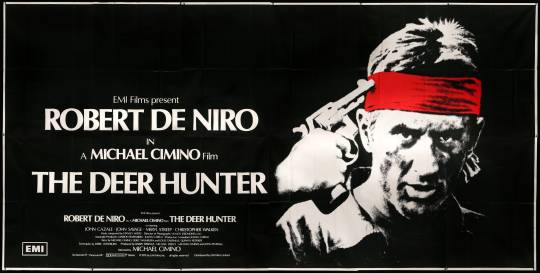
The movie begins in Clairton, where the group of friends are punching out of the steel mill and grabbing a beer at the bar to pre-game before Steve’s wedding that night. Steve’s partner, Angela (Rutanya Alda), is pregnant and they are having a grandiose Russian Orthodox ceremony before Steve heads off to Vietnam. The church hymns would return later in the film when Robert De Niro’s character, Michael, is stalking deer. This is where Michael finds his spiritual peace. After the wedding, the men head into the mountains for one last deer hunt before Michael, Nick, and Stevie are off to Vietnam. The film then hops the ocean to portray some very troubling scenes of war, along with the deadly Russian roulette “games” that the Vietcong imposed on captured US soldiers in the film. The movie then follows Michael’s returns home to depict the celebratory, yet grieving community of friends and family.
youtube
"The picture is a long, sprawling epic-type in many ways more novel than motion picture. It employs literary references stylistically, forecasting events which will happen in the film. Events are foreshadowed by the way the camera moves and by epigrammatic hints made by characters–techniques more frequently related to book writing. Cimino’s film is worthy of serious study and certainly will be treated to much analysis during the next year, and decade as well." -Charles Schreger for Variety, November 1978
What makes this film more touching, is that this would be actor John Cazale’s last film. He was diagnosed with lung cancer before filming and would pass on before The Deer Hunter was released in theaters. Mr. Cazale’s credits included The Godfather franchise, The Conversation, and Dog Day Afternoon. He would star in five films in the seventies. All five films were nominated for the Academy Award for Best Picture. John Cazale and Meryl Streep were in a relationship together and his passing affected her greatly. Ms. Streep would accept the role as Linda so she could be by John’s side while filming. Robert De Niro paid for Mr. Cazale’s medical insurance to help save his friend and keep the production of the movie in motion.
youtube
The Deer Hunter was both critically and financially successful. With a budget of 15 million dollars, it would go on to gross just shy of 49 million, domestically. There were many glowing reviews for The Deer Hunter in major publication throughout the country. The amount of recognition the film received through accolades and awards is astounding, especially considering this was only the second film by director Michael Cimino. It was nominated for nine Academy Awards and won five of them. Amongst the awards were Best Picture and Best Supporting Actor for Christopher Walken. Rotten Tomatoes lists The Deer Hunter with an 86% on the “Tomatometer” and 91% audience score. The negative feedback about the film mostly revolved around Mr. Cimino’s bigoted depiction of the Vietnamese. The Russian roulette scenes were also derided by some for being historically inaccurate, as there were no such records of this ever happening.
“More terrifying than the violence--certainly more provocative and moving--is the way each of the soldiers reacts to his war experiences. Not once does anyone question the war or his participation in it. This passivity may be the real horror at the center of American life, and more significant than any number of hope-filled tales about raised political consciousnesses.” -Vincent Canby, The New York Times, December 1978
The film depicts hard times in America, and most certainly in Vietnam. Families don’t have much in terms of material wealth, but their lives and relationships are rich with endearing connections to one another. The cinematography brings you right into the scene with the actors and there is an abundance of grit throughout the film, both in style and substance. Although this was only the sophomore release from Mr. Cimino, the A-list cast of actors (especially De Nero, after starring in The Godfather II and Taxi driver) and the 15-million-dollar budget lends The Deer Hunter to be more of a conventional movie. The intense depictions of the Vietcong and the Vietnamese, along with the subject matter of putting a gun to your own head and pulling the trigger could upset, aggravate, or alienate certain audiences, which does add some elements of being unconventional, as well.
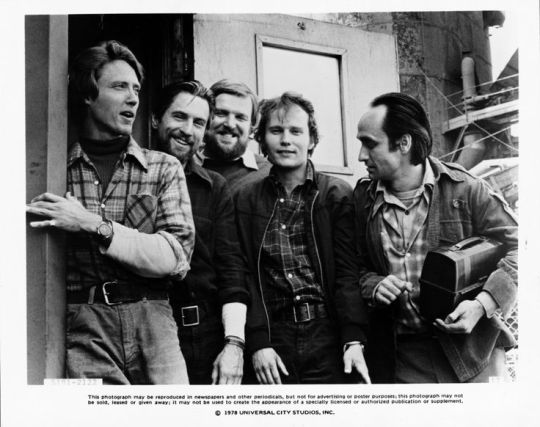
The Vietnam war left a massive stain on the quilt of American history. To this day, a lot of soldiers who survived the intense, dragging battle have permanent scars that cannot be seen. The Deer Hunter sheds some light on the scope of the experience, not only within the borders of Vietnam, but also how the war shaped and affected the lives of family and friends of the soldiers who either enlisted or were drafted. The film ends with the remaining group of friends singing the most somber, poignant version of “God Bless America”, leaving us with a stinging rebuttal for the cost of serving your country with a machine gun.
4 notes
·
View notes
Note
what are your favorite heroines written by fitzgerald? and by thomas hardy? and by dickens? and by your other favorite authors? ♡
i cannot believe i’ve had this blog for 84 years and i've never done an official ranking of my girls! i limited myself to twenty characters (one per author), but if an author has more than one amazing heroine, i will be talking about all of them. so let’s start at the beginning, a very good place to start! 💗
1.) estella havisham. my forever girl, my number one heroine when it comes to serious literature, and the blueprint for all my bitchy rich girl faves - of which there are many on this list. but no one compares to estella! you might be a spoiled brat, but have you been bent and broken into a better shape?
2.) natasha rostova / kitty shcherbatsky. i think i would ultimately choose natasha if it ever came to that - she’s just a richer character, and one of the only major literary heroines who has a killer sense of humor - but kitty is my sweet pink marshmallow. it’s a very close call!
3.) cosette / eponine. again, i can’t choose. i think eponine is the more complex and sophisticated character, but cosette is so GOOD! she’s just loveable, which is a very hard quality to pin down. i love them both so much. 10/10 for each!
4.) eustacia vye, followed so closely by tess that the difference is infinitesimal. tess is the greater heroine (goodness made interesting - name a bigger challenge in literature!), but god, i fucking love eustacia. the chapter introducing her in return of the native is still the single best in-depth breakdown of a character’s personality that i have ever encountered in a novel.
5.) anne shirley, because she’s been with me my entire life and has taught me more about happiness than any other character i’ve ever come across. “the iron has entered into my soul, diana!”
6.) isabel archer. does she make poor decisions? yes. would she have been better off without the money? double yes! but the drama is what makes her shine. i know this book is dense, but read it anyway - because if you don’t, you’ll never meet isabel, and you will miss out on one of the richest experiences of your life. it’s not a light read, but it is my favorite read.
7.) emma bovary, my favorite mess. she’s mean and unrealistic and a little stupid, but that scene at the end where she just cracks open and all her anger comes spilling out is what makes her amazing. the french have a flair for tragedy (c'est dans le fucking titre in the case of les mis!), but nothing compares to the heartbreak of watching emma, who thinks that death will be like falling asleep, when she feels the arsenic start to work and realizes she was wrong: “oh! it is beginning!” it will not be an easy death. she is not an easy character. but mon dieu, i adore her!
8.) catherine barkley. brett ashley is hemingway’s best female character, but catherine is the one who has my heart. she’s incredibly romantic and feminine and starry-eyed (with the most beautiful hair in all of literature!), but what makes her great is that this dreamy quality is a deliberately willed reaction to intense trauma. she CHOOSES to love. she is proof that you can be a girly girl and still be made of iron and steel. she’s so smart and courageous, and i am forever obsessed with her!
9.) sibyl vane, the girl who died for believing in fairy tales.
10.) tatyana larina rounds out my top ten for leaving onegin on read after he left her on read. the russians have the best heroines. i will not budge on this!
11.) yvonne de galais. she’s a ten (or in fournier-speak: “the fairy, the princess, the dream of love itself!”), but she can’t hold on to her man. 💔
12.) emma woodhouse. i’m not a huge austen fan, but i feel like out of all the girls on this list, emma would “get” me the most and go out of her way to befriend me. we are, unfortunately, very much alike.
13.) beatrice. do you know how much i suffered over choosing just one shakespeare heroine? an impossible task, but a girl who loves to laugh as much as bea does deserves to be number one. (it’s why the très witty rosalind is a close second, followed by the more tragically-inclined ophelia.)
14.) rosemary hoyt. this was the hardest one. i ultimately went with rosemary because she has all the qualities of the quintessential fitzgerald girl (young, fun, glamorous, spoiled, beautiful), but she’s much more likeable than rosalind, gloria, daisy, or even my beloved jordan. also in the top three are eleanor savage, who would be number one if she had her own book (“here am i with the brains to do everything - too bright for most men, and yet i have to descend to their level!”), and cecilia brady, hollywood princess extraordinaire and the west coast equivalent of nick carraway.
15.) amy march, america’s least favorite sister - and my personal favorite. this country has no taste. no wonder amy left!
16.) linda radlett. a little awful, but terribly funny and, in a weird way, kind of admirable in her single-minded ~pursuit of love. my mom wanted to watch the lily james version, thinking it would be a nice downton-esque period drama, and i had to tell her v. bluntly that there is nothing nice about the pursuit of love and that i couldn’t watch it with her because i knew she would hate linda. some things are just too sick-making!
17.) miss holiday golightly, travelling!
18.) lucy honeychurch. aside from being a genuinely cool girl who rejects the second-worst man in all of literature (the ultimate worst being angel clare), she also has the greatest name in the canon, which guarantees her a position in my top twenty.
19.) marguerite gautier, just because she’s actually marie duplessis and my love for marie is boundless and obsessively documented.
20.) franny glass. there aren’t many girls who possess the crazy level of self-confidence required to order a glass of milk in a restaurant while wearing a glam raccoon coat, but franny is one of the few. i related to her an embarrassing amount when i was a teenager, and while the association has faded, she remains my favorite glass sibling to this day.
72 notes
·
View notes
Note
(all from the not-american ask game bc i love playing ask games w people! no pressure ofc :) )
3. does your country have access to sea?
5. favourite song in your native language?
6. most hated song in your native language?
7. three words from your native language that you like the most?
10. most enjoyable swear word in your native language?
19. do you like your country’s flag and/or emblem? what about the national anthem?
20. which sport is The Sport in your country?
24. what other nation is joked about most often in your country?
27. favourite national celebrity?
i picked the ones i'd have the most fun answering, so i hope you have fun w these!!! :D
thank you so much for asking!! and sorry it took a while :) (i had to edit this to add a cut because boy did it get long. brace for some history bullshit)
3. does your country have access to sea?
unfortunately, it doesn't, so we usually travel to maritime countries (especially croatia, bulgaria...) in summer. however, we have dams, reservoirs and lakes that we often choose instead of the sea!
5. favourite song in your native language?
i am not THAT involved in our music scene, but strmá voda by billy barman is pretty cool, za sklom (from the kam ideme album though!!) by korben dallas too. and i have a deep history with the whole na skle maľované (originally na szkle malowane in polish, "painted on the glass") musical. do batôžka by katka knechtová shaped my childhood as well AND i know it basically said one song so i'll stop now, i promise.
6. most hated song in your native language?
our rap is... not my favourite thing. it sounds silly to me, to be honest, so most rap songs. and the radio ones are annoying too. hi to pomaranče z kuby, if i hear you one more time i'm gonna cry <3
7. three words from your native language that you like the most?
okay, this is not be based on their meaning, but the way it feels to pronounce them-
krémový (creamy), žblnkať (to make the plopping sound of water (?)), holubienka (help how do i translate the ✨vibe✨ of this,, it's an outdated pet name, basically. an old-sounding diminutive for dove)
but the one i use the most is a non-literary word: ✨oné✨, aka "that thing", aka a word you use for everything you forgot the word for.
10. most enjoyable swear word in your native language?
love me some good do piče (stolen from my friend @hyperobsession because he has a way with words that i don't: "the meaning is basically the vulgar designation of vagina"). jebať (to fuck) is fun too, use some prefixes and you get some brand new swearwords with different meanings. BUT i also love some outdated ones like papľuh, ej ci bisťu, kulifaj... the list goes on.
19. do you like your country’s flag and/or emblem? what about the national anthem?
the anthem slaps, mainly historically speaking (reverse pink floyd basically: hey, kids, leave our teacher alone), nowadays there are no lighting bolts to wake us up however, and our flag...

listen. i have Opinions about our flag. not about the similarity with the russian one (correct me if i'm wrong, but i believe the russian tricolor is basically a modification of the dutch one, while ours was a red-white bicolor at first and then adopted a blue stripe to symbolize our croatian "brother nation" in austria-hungary and our "patrons" russians in 1848, making the slavic tricolor, modeled after the russians? and we basically had to add the emblem as to not clash with the russian flag after the dissolution of the soviet union. anyway. the revolutionary year of 1848 will forever haunt me). where my amusement peaks (no pun intended), however, is the said emblem. noticed it's basically the right (left for the heraldists out there) part of the hungarian coat of arms?

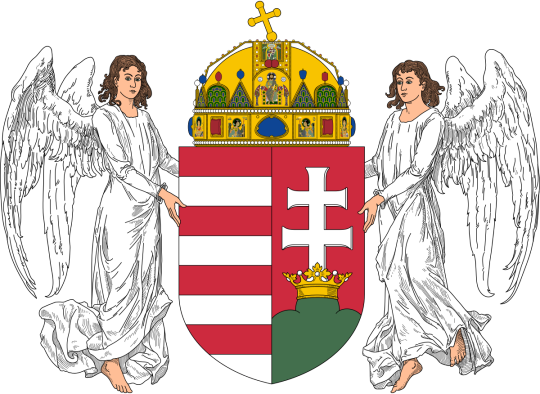
yada yada the double cross from cyril and methodius, the red background because ✨emblems✨, everything is basically connected to the hungarians through austria-hungary... that's where the triple peak, my favourite part, comes in. it symbolizes the three mountains of matra, tatra and fatra, formerly on the hungarian soil, right? and it had many colours over the years, ending with green, until slovaks said nah, fuck this, we don't like it here in austria-hungary, yoinked the emblem (but said fuck your crown too and, of course, changed the colours, don't let the teacher know i let you copy my homework, slovakia) and eventually took tatra and fatra too. the funny thing (to me) is that the blue triple peak feels like a fuck you, we took your mountains to hungarians now.
(no offense to hungary, of course. i'm part hungarian. it just feels funny)
also- god, who let me speak. sorry for the history lesson. maybe it's not even correct. don't quote me on this info.
20. which sport is The Sport in your country?
i guess most kids play football (soccer) in their childhood, but the most promoted one during championships might be hockey...? not sure, actually. i wouldn't consider us a big sports nation, but it might be because i'm not involved in the scene (except for hockey, kinda).
24. what other nation is joked about most often in your country?
the hungarians and the czechs, for sure. i won't get into why it's like that because peace and love blah blah blah. but it's definitely them. also the poles, but not the whole nation i think, mostly just the language.
27. favourite national celebrity?
eh- good question? i have some actors that i like to see in theatre/tv, but apart from their roles, i know nothing about them, so... i don't think i have one.
(i googled "slovak celebrities". i didn't know those people existed. i'll leave it at this)
thank you again for this ask, i did have a lot of fun!! especially with the history part, which i'm, again, sorry for :D (but not really. only like. half sorry)
7 notes
·
View notes
Note
🍓, 🍊 & 🍑 please. x
🍓 What’s a fic you’ve written you feel is underrated?
my apocalypse series? i love this series. every single story in this is so important to me and granted i write for a small, dying ship but they also never have attracted a big audience and i just. i love them!!!
🍊 Who’s a character you don’t write for that often, but keep meaning to write for more? (They’re so interesting! But maybe you have trouble pinning them down, or keep getting distracted by another blorbo…)
okay, lannister sibling dynamics. i care about them so much but cersei and jaime are always ghosts in my fics and this is terribly unfair to them and their totally fucked-up-ness. i think about it constantly. and then i do nothing about it.
🍑 If you could make a connection between your favorite character and another work you care about (whether a crossover/fusion or a wonderfully “pretentious” literary reference) what would it be? How would it work?
okay. i need you to sit down and listen to me. roman roy as Teiresias. i don't know if you watched succession. but my theory is that the series finale like (spoken by roman) "we are not real people" does two things. it acknowledges that a. this is a fake show not happening in real life and b. they have never grown into identites beyond themselves. each roy sibling is enacting a different variety of tragedy. this means that they all are complicated, enacting different types of harm, playing out different tropes and references all simultaneously to each other. they can't connect because they are existing in separate doomed narratives.
kendall roy is pretending to be hamlet...being hamlet is easier. hamlet is self-righteous, innocent until he kills polonious, self-indulgent, self-destructive. he is the hero of his own story. this is an easier reality to face than the fact that kendall is just some guy. kendall isn't hamlet...he's just an average prick who killed a kid. and shiv does not allow him to finish the fantasy, does not give him a dramatic conclusion. he is haunted by a ghost--not of his father, but of the person who he killed. he thinks he's shakespearean but he's actually russian tragedy where you don't get to escape you just have to LIVE WITH WHAT YOU HAVE DONE. secondly, shiv is living out an ibsen play. dollhouse, yes, but also ghosts...which is all about inherited curses. the literal curse of being a woman, of sexual sin and indiscretion.
BUT ROMAN. ROMAN feels decidedly greek to me. roman's fate is always decided by people who are bigger and stronger than he is, it's pre-determined. "why couldn't it be me?" because you're a mortal amongst gods baby girl. his struggle and tragedy is about a loss of faith and the consequences of faith more than anything. i think a lot about aprohdite and helen's interactions in the illiad where helen, on the surface-level, makes choices but is compelled by aphrodite, implying that her consent is compromised. HELLO ROMAN FIRING GERRI ROMAN EXISTING ROMAN DOING WHATEVER
he's also the most plainly queer to me. I read an article once about the iliad about how women tend to serve as memory-keepers. roman is this to me. he remembers things about their childhood that the others have softened or forgotten (i.e. the dog cage, being the most prominent example). he mourns and weeps for his lost father. so he's living in a greek tragedy but he's not serving in a male role. you know who else existed as a different gender for a time.
TIERESIAS
he's not a hero, he's not the main character. he often observes the outside, telling the truth, predicting the failures of those around him. oh my god??? he's more participatory than a chorus...and his actions have critical ramifications on the plot and yet he's not the hero, his purpose is to contrast and comment on the action of the tragic protagonist (kendall) TIERESIAS IS THAT YOU
there's also just like. Moments. kendall goes for roman's eyes in the fight scene. you know what happened to tieresias. he was blinded for insolence to the gods. tieresias dies by drinking poisoned water. oh my god? like a martini. WE LEAVE ROMAN DRINKING. THIS IS WHERE THIS PART OF HIS LIFE DIES.
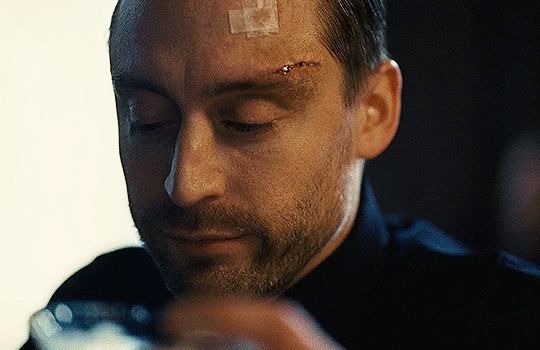
find me constantly here.
anyway, hi how are you how is your night going.
3 notes
·
View notes